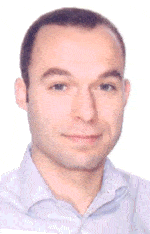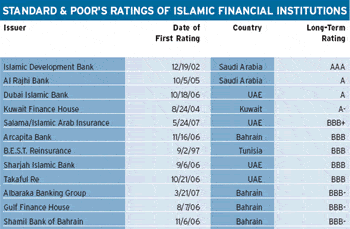Investor demand, banks’ creativity and deep pools of liquidity in the Middle East are driving strong growth in the development of Islamic investment banking products.
 |
|
Hassoune:“Investors and entrepreneurs must hare the risks and rewards of a given venture” |
Dubai Ports World’s takeover of UK-based port operator P&O; last year was financed in part with Islamic “bonds,” or sukuk, that were oversubscribed more than four times, receiving a total of $11.4 billion in bids. Because of investor demand, the issue was increased from $2.8 billon to $3.5 billion.
The market for sukuk, which are more akin to asset-backed securities than bonds, grew 75% in the first half of 2007 to reach $85 billion of outstanding issues. Islamic finance also is growing fast in the private equity sector. A $400 million issue of sukuk backed the $1.4 billion leveraged buyout of Egyptian Fertilizers in June.
The application of Islamic financing principles in mergers and acquisitions and LBOs are just two examples of Shariah-compliant corporate finance, a field that has emerged only in the past five years. Led by the sukuk’s popularity, new Islamic finance products have been created to meet most of the needs of a corporation, from asset financing and working capital to risk management and currency swaps.
British sports-car maker Aston Martin is being transformed into a Shariah-compliant company now that it has been acquired for $1.2 billion in an LBO by a consortium that included two Kuwaiti investment companies, Investment Dar and Adeem Investment. WestLB arranged $450 million of Islamic financing to back the purchase of the maker of James Bond’s favorite sports car, a DB5. US investment bank Jefferies acted as M&A; adviser to the buyers, who were led by entrepreneur David Richards, founder of Prodrive, an automotive engineering group based outside of London.
In the largest sukuk issue to date, Dubai-based real estate developer Nakheel Group, famous for its palm-shaped islands, raised $3.52 billion early this year. Dubai Islamic Bank and Barclays Capital were the lead underwriters of the issue, which included an innovative equity-linked structure. On any future qualified public offering, or QPO, by Nakheel before the sukuk are redeemed, investors will have the right to subscribe to a certain amount of shares. If there is no QPO of sufficient size, investors will be paid a higher return or “yield” at the time of redemption. The notes were listed in both Dubai and London.
Although options and derivatives are a touchy subject or “grey area” in Islamic finance, convertible sukuk are allowed by Shariah boards and, in effect, are similar to options. New Islamic capital market instruments and rudimentary secondary markets for trading are being developed, notably in London and Dubai. The demand for sukuk has been so strong, however, that few are available for trading. Investors have been following a buy-and-hold strategy, and price discovery is not optimal.
Governments in the Gulf region have been giving a boost to the sukuk market by requiring that every project and infrastructure financing must include an Islamic financing tranche. There are now more than 300 Islamic financial institutions operating worldwide, and most major banks have become involved in this fast-growing business, which is centered in Malaysia and the Middle East, with a growing presence in the United Kingdom. Total assets of the Islamic financing industry have reached an estimated $500 billion, which is a drop in the ocean of global finance but is material from the perspective of the size of regional economies. Islamic assets stood at about $150 billion in the mid-1990s.
Standard & Poor’s Ratings Services announced in late September that it would introduce stability ratings for Islamic banks with profit-sharing investment accounts, or PSIAs. These accounts are an important source of funding for Islamic financial institutions, much like conventional banks rely on savings and checking accounts as a funding tool, says Anouar Hassoune, credit analyst at S&P;, who is based in Paris. But unlike conventional time deposits, PSIAs comply with Shariah law, which forbids the payment of interest, or riba. Instead, PSIA depositors are entitled to receive a share of the bank’s profits but are also obliged to swallow any potential losses on their investment. “This profit-sharing principle is a key concept in Islamic finance, according to which investors and entrepreneurs must share the risks and rewards of a given venture,” Hassoune says.
Standard & Poor’s expects to issue its initial stability ratings for Islamic banks with PSIA accounts in the first quarter of 2008, Hassoune says. The ratings will represent the agency’s opinion about the expected stability of cash flow distributable to account holders on a scale running from SR-1, the highest rating, to SR-7, the lowest. The ratings will incorporate analyses of the financial institution’s structure and governance, as well as business risk and financial risk profiles.
“We are targeting Islamic banks as economic entities,” Hassoune says. While the stability ratings have nothing to do with sukuk issues, investors are eager to learn more about specific issuers, he says. “Looking at the Middle East region as a unified whole is misleading because of its diversity,” he adds. “Per capita income, for example, ranges from $600 in Yemen to $60,000 in Qatar. A Kuwaiti citizen earns more than someone working in Luxembourg.”
Rather than looking at the region from afar and seeing a desert, one needs to see the granular detail, Hassoune suggests. “Investors need more micro information about issuers,” he says. “They need to know about the capacity and willingness of an obligor to honor its obligations, since they are taking on the obligor’s fundamental risk,” he says.
Modern Islamic financing emerged in the mid-1970s with the founding of the first large Islamic banks: Saudi Arabia’s Islamic Development Bank, Dubai Islamic Bank and Bahrain-based Albaraka Banking. “Demand rather than supply is driving the development of Islamic products and services,” Hassoune says. Demand for Shariah-compliant investments and loans began to take off in the early 1990s against a backdrop of abundant liquidity flows from recycling petrodollars in regional economies.
Hassoune says the European banks are establishing operations in wholesale banking by recycling funds flowing out of the Gulf region into Shariah-compliant asset classes in Europe. London has a good chance of emerging as a center of such activity, although Britain’s plans to become the first Western government to issue Islamic bonds seem to have been put on the back burner with the recent departure from the UK treasury of Ed Balls, the main proponent of the sovereign sukuk offering.
While Western banks such as HSBC, Barclays Capital, Citi, Calyon, BNP Paribas, Deutsche Bank and WestLB, among others, are making inroads into Islamic financing for corporations, new Shariah-compliant investment banks are also emerging, mainly in Gulf Cooperation Council (GCC) countries. Bahrain alone has Arcapita Bank, Gulf Finance House and Unicorn Investment Bank.
Arcapita, formerly First Islamic Investment Bank, has a private equity arm based in Atlanta, Georgia, which has been buying up stakes in US companies such as Caribou Coffee, TLC Healthcare Services and Church’s Chicken. Meanwhile, East Cameron Gas, based in Houston, Texas, last year became the first US-based issuer of sukuk, with a $166 million asset-backed issue handled by Merrill Lynch and Lebanon’s Bemo Securities.
In August Merrill Lynch announced that it would list two new certificates on the structured-products platform of the Dubai International Financial Exchange. The certificates will be linked to the first index designed to track stocks listed on the Dubai Financial Market. Merrill Lynch introduced that index, the Dubai Investable Index, in November 2006. The first new certificate will track the index, while the second certificate will be the first listed reverse convertible linked to the index. It will offer a 9.5% fixed return, and the initial investment will be guaranteed as long as the index does not decline by 20% or more during the one-year life of the issue.
Malaysian issuers accounted for the leading share of the Islamic bond market last year, with volume totaling $5.6 billion, an increase of 31% from the year before, according to London-based Dealogic. CIMB Islamic, based in Kuala Lumpur, was the leading bookrunner of sukuk, with more than 22% of total volume in 2006. Malaysia’s Shariah-compliant framework includes all the major components of a financial system, including a money market, a capital market, derivatives and microfinance.
Standard Chartered Bank Malaysia signed the first-ever Islamic cross-currency swap deal in July 2006 with Bank Muamalat Malaysia, a domestic Islamic bank. Standard Chartered says it was the first international bank to offer an Islamic banking window in 1993.
While Malaysia is home to the standard-setting Islamic Financial Services Board, Bahrain is vying to create industry standards through the Accounting and Auditing Organization for Islamic Financial Institutions (AAOIFI).
Meanwhile, Saudi Arabia, the largest economy in the Middle East, has progressively liberalized its banking system since the enactment of the Capital Markets Law in 2003. The same law liberalized the market for investment banking, brokerage and securities services. The Saudi Monetary Agency (SAMA) ordered the separation of these activities from conventional banking.
Saudi Arabia is swarming with investment bankers who are eager to bring to market the next batch of initial public offerings to deepen the Saudi stock market. There are only 78 firms listed on the Saudi exchange, the same as the number of firms the Capital Market Authority has licensed to conduct securities business in the kingdom.
One of the first licenses was issued to HSBC Saudi Arabia, a joint venture with Riyadh-based Saudi British Bank (SABB). Bahrain-based Gulf International Bank (GIB) announced in September that it recently obtained a license to establish a securities company in Saudi Arabia, which will offer corporate finance advisory services, as well as brokerage, securities dealer, underwriting, fund management and custodial services. Other offshore banks in Bahrain are also coming: Ithmaar Bank is investing $6.1 million in Ethraa Capital, an investment company jointly owned with Saudi-based Atheeb Trading and Kuwait Investment Company.
Among a wave of US-based firms, Merrill Lynch announced in June that it received a license to offer investment banking products and wealth management services in Saudi Arabia. “Riyadh has acknowledged the role it can play in developing the financial services sector of the Middle East,” says Jeffrey Culpepper, Merrill’s head of global markets and investment banking, Middle East and North Africa. Earlier this year, Morgan Stanley announced its intention to enter into a joint venture with The Capital Group, a local investment group in Saudi Arabia. The venture will operate under the name Morgan Stanley Saudi Arabia. Bear Stearns and a group of Saudi investors led by Prince Mishaal Bin Abdullah Bin Turki Al-Saud, CEO of Zad Investment, formed an asset management joint venture targeting wealthy clients. It will offer traditional investment products, including equity, fixed-income, hedge fund and private equity investments, and will develop specific offerings that comply with Shariah.
Markets in the Middle East have a low correlation with other global markets and offer investors diversification benefits, says James Gotto, London-based fund manager of Schroder ISF Middle East, a fund launched in September by Schroders to invest in 30 to 70 companies in the region. Schroders opened an office in Dubai earlier this year. “While oil is important for some countries and is boosting investment in local infrastructure, broader demand for consumer and financial products is set to rise across the region,” Gotto says.




